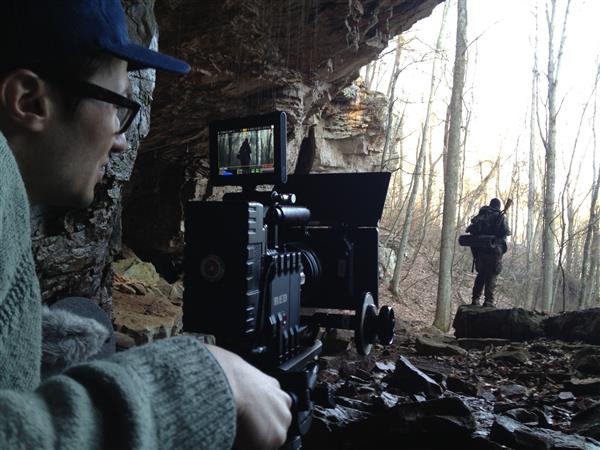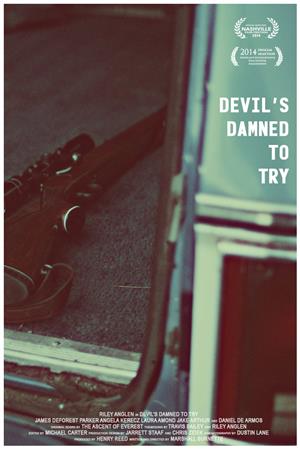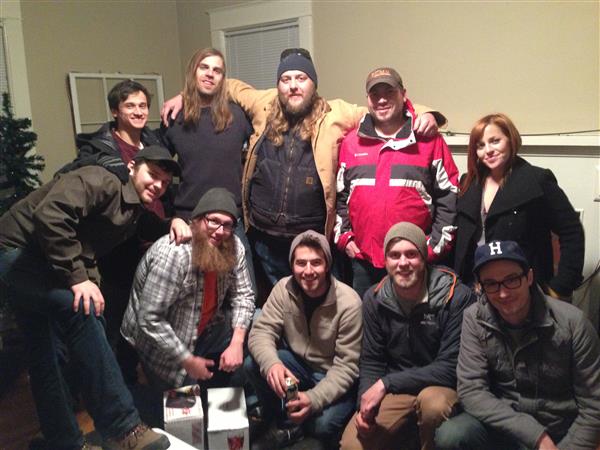

Devil’s Damned to Try, by Marshall Burnette
Murfreesboro Pulse: How would you describe your film?
Burnette: Devil’s Damned To Try is really a story of guilt and regret. It’s about a man who makes an accidental mistake and decides to keep it a secret. The film is essentially a drama, but constructed like a thriller. It’s definitely a puzzle for the audience.
What challenges did you/your crew encounter while making the movie?
As with any independent film, and most studio films, money and time were the main resources lacking during our production. luckily, we knew this would be the case, so the film was somewhat written to be made on a minimal budget and shooting schedule. I think everyone had a great time during production. The crew was awesome, everyone brought their own unique talents into play and made them shine. It helps keep crew moral up when you have such a charismatic lead actor around all the time. Riley Anglen could lift any wayward man’s spirits. The weather even looked out for us, which was very important since 75 percent of the film is shot in natural light.
How long have you been working in motion pictures?
I use to make ridiculous horror film parodies and spy movies in my basement on a big VHS camera when I was a kid. I didn’t really do it thinking about the future or anything, but that was probably the start. I didn’t understand editing, I thought films were all shot in order, so I would cut the camera then move to a new angle and have the action start from where it left off. It wasn’t until I was around 21 that I started pursuing filmmaking as a potential identity. I’m 27 now, so it hasn’t been very long. Long enough for me to learn how editing works.
In the process of film-making, how much of the creativity is found in production? How much improvisation do you find on set?
I like to write in a way that leaves lots of flexibility while shooting. Devil’s didn’t really have any dialogue on the page, of course Riley doesn’t say a word in the film, but I wanted people around him speaking. All that was created on set. I try and work with actors who can read a scene to get the idea of what I want to say then put it in their own words on set. My good friend, Daniel De Armas or “Miyagi”, has a little part in the film where he tells a story about getting his car stolen. That was just him telling a story about something that really happened to him. A lot of the scenes just involved Dustin, our DP, keeping the lens pointed at Riley as he did whatever came to mind.
What attracted you to the medium of film?
Power. A good filmmaker can turn a person’s emotions on and off like a switch.
What would you say of the place motion pictures have in our culture?
Well, its huge. It’s the largest artistic realm functioning today. I guess the music industry is pretty big too, but Hollywood plays with such large amounts of money its amazing! I’m just very glad that there is still a place for independent conscious storytelling among the moneymaking formula films. I know motion pictures have had a huge impression on my life as well as many of my good friends. If you’re open to learning as well as being entertained, watching films can be an emotionally educational experience, similar to visiting the library and loosing yourself in a book.
What makes a great movie? What elements do you think an audience should look to appreciate?
A great movie to me has a purpose to every single frame of the film. The dialogue is there to build character, not plot. People are not black and white, there is no such thing as a perfect person in real life so why should there be in film? Even the good guys do evil things. Above all, I look for honesty in storytelling. A director can’t be embarrassed to put a couple of his demons into the story.
If you could change one thing about the process, what would it be?
Having to wait on computer renders sucks.
How did you learn your craft?
I learned how to tell a story by watching films. I learned about movie magic by reading. And I learned how the gear works at film school. I’m still trying to figure out the business part.
What themes do you like to explore in film?
Well, I do believe in and try to follow the “write what you know” theory. I’m definitely drawn to small town blue-collar type stories. These often deal with issues of regret, self sacrifice and jealousy. I think we can all connect with those themes.
What inspires/influences you?
My friends’ films. My family. My hometown. And rusty old buildings.
Are there any particular genres you favor over others?
I get a kick from watching a little bit of everything, but I have been really obsessed with Australian dramas and thrillers the past few years.
In terms of motion picture production, what would you like to see from the state of Tennessee? What advantages does the state currently have, and how do you think it could improve?
I’d really just like to see more recognition of honest work in Tennessee. The films that seem to get noticed are the ones about tourist industries like country music and Graceland. I have some friends making beautifully honest films about real Southern people and I just wish that they would get the attention they deserve. Keep an eye out for work from Michael Carter, who edited Devil’s, and Daniel Henry. They’ve got big things in the works.
On what projects are you currently working?
I’ve got a couple scripts in the works. One is a small town story about a tragic grain silo death, the other is a period western. And I really enjoy short form work like music videos and commercials too.
What advice do you have to aspiring filmmakers?
Just don’t be an asshole. No one wants to work with an asshole.
What do you see for the future of storytelling through motion pictures?
I don’t know, things might get crazy. Hopefully I can still watch my DVD’s when I’m an old man though.














